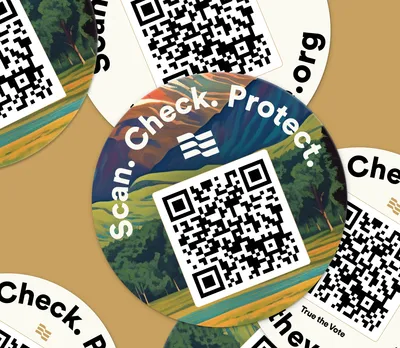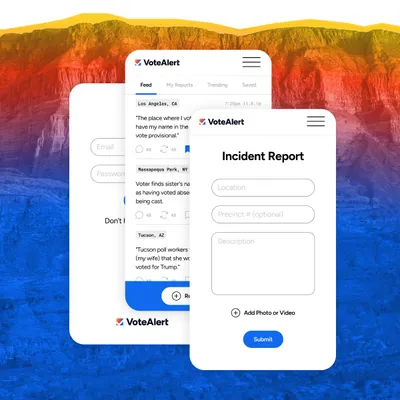
Love your country. Protect your vote.
Why True the Vote?
Every aspect of American life is built on the bedrock of trustworthy elections— an indispensable right that gives citizens a say in the direction of the country, allowing the will of the people to guide our government and be reflected in our laws. Safeguarding elections is a cause rooted in the principles of ordered liberty and individual empowerment.
Far too many Americans, feeling their votes lack impact, choose not to participate. In doing so, they unwittingly surrender their vote and voice to the government. We must vote … but that’s not all … we must also shoulder the responsibility of the electoral process. It is imperative that all freedom-loving citizens actively engage in this essential civic duty. We need all hands on deck.
Trustworthy elections are worth working to save. Together, we can True the Vote.
Get Involved

Scan. Check. Protect.
Register to vote or update your registration.

The 611 Project
Help fight against non-citizen voting.

VoteAlert
Join the frontline of election protection.
What can I do?
Don’t just observe history. Shape it!
Your involvement is key to ensuring a transparent and trustworthy electoral process. Be a part of the movement for a stronger republic.
Voting is your most powerful tool! Not sure if you're registered? We can help you check.
Browse toolkits designed to educate and equip citizens to defend their voting rights, from observing polls to organizing events.
Use our guide to find everything from state election laws to official contact information.
Have a question? Problem to report? Our Helpline is here to help safeguard our votes and restore confidence in our elections. Let us hear from you - we’ll do all we can to help!
Want to support our work? We'd love your help.
Join our community so we can work together to True the Vote. Receive weekly newsletters and information on events, resources, and opportunities. We'd love to have you on the team!

The Latest from TTV
This is where transparency meets accountability. Keep up with all of True the Vote’s latest developments, breaking news, analyses, and updates from the front lines of our work toward election integrity.
Fundamentals of Governance
Today, we know it doesn’t take much to swing an election. Many races are decided by less than .5 percent—which comes down to one out of 100 ballots. Even a small amount of fraudulent ballots can make up that small a margin, which means elections can be manipulated far too easily.
After widespread irregularities in the 2020 presidential election and numerous reported problems in the 2022 midterms, Americans are justifiably concerned about the integrity of our electoral process.
At True the Vote, we believe every legally cast vote must be counted. When we participate in the democratic process, we exercise our fundamental right to self-governance.
Elections should be mechanisms to hold politicians accountable and give the American people a voice on the direction of government. That’s why voter fraud and violations of election rules and procedures undermines our ability to be a self-governing people.

FAQs
Election fraud is any attempt to subvert or manipulate the electoral process by illegal means.
Election fraud is notoriously difficult to detect, investigate, and prosecute. In many ways, voting is based on the honor system, and relatively few safeguards are in place to prevent fraud. While most people are honest and law-abiding, there are individuals who purposefully exploit vulnerabilities in the election system in order to manipulate the outcome of elections or impose their will on other voters, in violation of the principle of “one citizen, one vote.”
There are over 100 different criminal offenses within the Election Code, but the majority fall into a few major categories:
- Illegal voting: Illegal voting is when a person who is not qualified to vote, such as non- citizens, non-residents, and felons, casts a vote. Illegal voting also includes voter impersonation or voting another person’s ballot.
- Mail Ballot fraud: This activity is also known as vote harvesting. Vote harvesting exploits the inherent insecurities of the mail ballot system in two phases: seeding and harvesting. In the seeding phase, applications for mail ballots are generated to saturate targeted precincts with mail ballots. Commonly used schemes involve gaining voters’ signatures by deception, intimidation, or forgery; and/or fraudulently making an application for a voter who is not qualified to vote by mail, often by claiming that an able- bodied person is disabled. In the harvesting phase, workers target voters as they receive their ballots in the mail and obtain votes for the candidates they support, either by intimidation, deception, compensation, influence, or outright theft of the ballot itself.
- Voter Assistance fraud: Exploiting the legitimate voter assistance process intended for voters who cannot read or physically mark their own ballots, in order for campaign workers to insert themselves into the voting process. Campaign workers approach voters in parking lots of polling places and, often implying that they are official election workers, tell voters they are going to "assist" them with the voting process. Election clerks are trained, under current law, not to question whether the voter is qualified for assistance or has requested the "assistant" to help them. Votes are then secured for the candidates of the assistant’s choice.
America’s voter rolls have been neglected, our technology is antiquated, and deceptive processes have become institutionalized. Our elected officials either accept it as a dysfunction, or use it to political advantage, either of which leaves our elections vulnerable. But elections are one place where citizens have a leading role to play inside a government process. The fight for fair and transparent elections is Constitutional Democracy in Action.
Some of the solutions to improving election integrity include reforms, such as voter ID for in-person voting and strengthened ID validation of mail-in ballots, clear and reasonable voter registration and ballot request deadlines, allowing counties to pre-canvass mail-in ballots before Election Day, ensuring the accuracy of the state’s voter database, and secured monitoring of any ballot “dropboxes.”
But none of this will happen without citizen engagement in the electoral process. True the Vote believes the first step toward restoring confidence in the process is educating people about their civic responsibilities and helping them get involved locally.
Yes. A voter’s ID ensures that the person casting a vote is who they claim to be.
We show ID for everything, from social programs to travel. In fact, 36 states have laws requesting or requiring voters to show some form of identification at the polls. The idea that there are certain populations who are unable or don’t know how to get an ID is a deeply offensive, false narrative. The loudest proponents of that narrative are - typically - those who have benefited from a lack of transparency and accountability in our electoral process.
Terms like “voter suppression” and “voter intimidation” are political soundbites that partisans use to attack their opponents. A voter’s right to participate in elections should absolutely be protected.
True voter suppression and intimidation are illegal, reprehensible acts, and should be prosecuted to the fullest extent of the law.
Yes, your vote counts. We cannot repair our election system without engaging in it. Show up to vote.
To better protect your vote, it’s important to know your rights as a voter:
- You have the right to vote however you choose. It is a crime for someone to pressure or influence you while you are voting.
- If you have a disability or if you are 65 or older, you have the right to vote by mail-in or absentee ballot or in person at the polling location.
- An elections official will never approach you at your home or outside of your polling place to offer assistance or take your ballot. Do not give your ballot to an individual you do not trust.
- You have the right to vote your ballot by yourself, in secret. Choose someone you trust to help you if you cannot fill out your ballot yourself.
- If you do allow a person to assist you with reading and marking your ballot, you have the right to inspect the ballot for accuracy.
- It is a crime for someone to take your mail ballot from you, unless you are physically incapable of mailing your own ballot and you request assistance.

